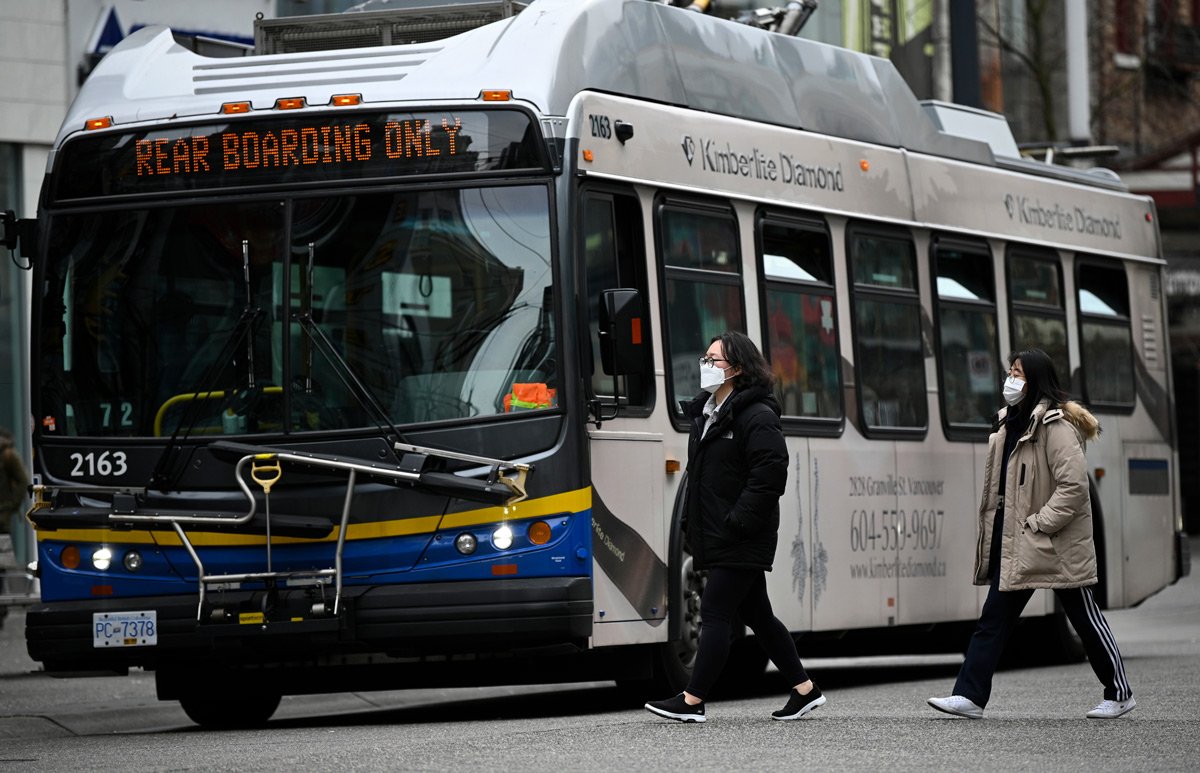Featured Guest
You’ll find this guest among our growing roll of Urban Champions.
-

Noreen Kassam
Deputy Chief Administrative Officer & Chief Financial Officer, City of Burnaby
-

Mary Persson
Deputy Minister, Infrastructure at Government of Alberta
-

Kelly Paleczny
General Manager, London Transit Commission
-

Enid Slack
Director, Institute on Municipal Finance & Governance, Munk School of Global Affairs & Public Policy, U of T
5 Key
Takeaways
A roundup of the most compelling ideas, themes and quotes from this candid conversation
1. Short-term crunch vs. long term needs
Municipalities are facing enormous fiscal pressures because of COVID-19. Cities require two strategies — one to face the immediate financial crunch and another to guide them toward long-term economic stability. Cities must find the money to continue to ‘keep the lights on’ and provide necessary services for residents — and especially the most vulnerable.
2. The burden of debt shouldn’t be kicked down the road
Across the board, cities are faced with a tough calculus. Some short-term solutions — such as borrowing from capital reserves, as BC municipalities are now allowed to do — may come at the expense of longer-term priorities, such as fixing and replacing ageing infrastructure, or building new infrastructure. On the question of debt, one of the panelists suggested that it may be better for municipal governments to find other ways to balance their spending now, instead of passing the burden onto the future.
3. What revenue tools will help us get out of the hole?
During and after the crisis, most cities will not be in a position to raise property taxes — where they get the bulk of their revenues — as residents and businesses get back on their feet. We need other ideas. Road tolls could bring in additional revenue while also limiting a potential spike in individual car usage. A municipal share of the income tax was also discussed.
4. The conversation about public services needs to happen
The financial crunch has provided an opportunity to reflect on the services municipalities provide to their residents. Cities and their provinces need to address whether municipalities will have the necessary resources to meet the needs and expectations of their residents. If a municipality cannot afford to deliver essential services during this challenging time, then other possibilities must be explored. However, every option (e.g. uploading responsibilities, public-private-partnerships, etc.) comes with its own tradeoffs and must be carefully and collaboratively considered.
5. Cities are more than just ‘creatures of the province’
During COVID-19, every order of government has been at the table together, collaborating on solutions. Coming out of the crisis, that collaboration should continue, and there is an opportunity to reevaluate who does what between the municipalities and provinces, and the role of the federal government.
Full Panel
Transcript
Note to readers: This video session was transcribed using auto-transcribing software. Manual editing was undertaken in an effort to improve readability and clarity. Questions or concerns with the transcription can be directed to events@canurb.org with “transcription” in the subject line.
Full Audience
Chatroom Transcript
Note to reader: Chat comments have been edited for ease of readability. The text has not been edited for spelling or grammar. For questions or concerns, please contact
12:30:38 From Sue Hallatt, CUI Staff WELCOME! We will begin very shortly…
12:31:01 From Abigail Slater to All panelists Hi mary
12:32:27 From Basana Dey to All panelists Hi all, Basana from Toronto Public Library…
12:33:00 From Canadian Urban Institute Folks, please change your chat settings to “all panelists and attendees” so everyone can see your comments. Enjoy the webinar!
12:34:43 From Andrew Payne to All panelists ;/’
12:35:36 From Andre Darmanin Hello all from Woodbridge, ON.
12:35:48 From Karey Steil Hello! From Edmonton.
12:35:54 From Julie Dawley Hi from Tillsonburg ON
12:35:54 From Krista Woltman to All panelists Hi Bonjour from Ottawa!
12:35:56 From anthony dionigi to All panelists hey from edmonton
12:36:03 From Andre Darmanin My old stomping ground – YEG
12:36:03 From Darren Randell Hello from St. John’s NL
12:36:05 From Jenna Grose to All panelists Hello from Vancouver
12:36:06 From Tracey Allen Hello from Prince Edward Island
12:36:15 From Ann Wong to All panelists are we all muted?
12:36:29 From Suzanne Kavanagh I love these chats, haven’t missed one yet from Picton ON
12:36:34 From Lisa Cavicchia, CUI Staff yes everyone is muted
12:36:41 From Kirk Biggar to All panelists Hello from Oakville, ON. We have been tuning in and getting a lot out of these conversations, thanks to all.
12:36:41 From Nancy Dube Hello from Victoria BC
12:36:52 From Canadian Urban Institute #citytalk
12:36:52 From Kathleen Llewellyn-Thomas to All panelists Hello from Toronto – particularly TTC – (costing the City of Toronto $25M a week) 🙈
12:37:08 From Can Chen to All panelists Hello from Miami, FL
12:37:09 From Almos Tassonyi Hello All: Looking forward to your insights
12:37:25 From Emily Wall, CUI Staff Today’s panel:
Noreen Kassam – https://www.burnaby.ca/Home.html
Kelly Paleczny – https://www.londontransit.ca
Mary Persson – https://www.edmonton.ca
Enid Slack – https://munkschool.utoronto.ca/imfg/
12:37:28 From Kirk Biggar Hello from Oakville, ON. We have been tuning in and getting a lot out of these conversations, thanks to all.
12:37:34 From Daniella Dávila Aquije to All panelists Hello from London, England!
12:37:34 From Brian Owen to All panelists Twiiter can be more of an ‘alternate’ universe … LoL
12:37:48 From Arlene Etchen to All panelists Hello from Aurora Ontario
12:37:50 From Lindsay Vanstone to All panelists Hello from Edmonton!
12:37:52 From Coleson Proudfoot Hello from Calgary AB! )
12:37:55 From Andre Darmanin Yes I remember Kelly Paleczny from my CUTA days such a long time ago.
12:37:59 From Katie Geoghegan to All panelists Hello from Vancouver BC. Thanks for hosting this!
12:38:09 From Katie Geoghegan Hello from Vancouver BC. Thanks for hosting this!
12:38:18 From Madelaine Morrison Hello from Ottawa, Ontario
12:38:34 From Cheeying Ho to All panelists Hello from Whistler! 🙋🏽♀️
12:38:57 From Andre Darmanin This is my first #citytalk. Looking forward to the discussion with a diverse panel.
12:39:25 From Augusto Mathias Hello from Sao Paulo – Brazil
12:39:50 From Sam Weller Greaating from Sam Weller of CAGFO in Victoria
12:40:57 From Sue Hallatt, CUI Staff CAGFO: Canadian Association of Government Financial Officers?
12:41:40 From Allison Ashcroft yes
12:42:58 From Andre Darmanin We need to use “physical distancing” now.
12:43:12 From Prabha Khosla Good Morning, from Burnaby, B.C
12:44:19 From Andrea Lam It’s totally changed my commute, I now am riding my bike to work. It’s safer – fewer cars on the road than before, but it sure takes longer!
12:44:40 From Caryl Arundel Good afternoon from rainy Toronto.
12:49:23 From Abigail Slater How do we ensure that in the future, Cities do to sell valuable resources (real estate) to cover deficits…how do we prevent “vulture” capitalists from scooping up those assets? And what if libraries are on the chopping block because suddenly everyone goes digital?
12:49:35 From Abigail Slater *do NOT sell
12:50:14 From Abigail Slater But cities are VERY restricted in how to repay? They cannot issue bonds of any sort…
12:50:33 From Lorne Cutler to All panelists Is BC considering doing away with universal deferral of property taxes by those over 55 and limiting it to only those below a certain income level such as the City of Ottawa does?
12:50:43 From Abigail Slater They are creatures of the Province…the province needs to allow for other ways for municipalities to raise funds…
12:50:47 From Andre Darmanin The glowing discrepancy with our current Constitution when it comes to the role and function of municipalities in Canada.
12:50:52 From Keshwer Patel to All panelists question to Enid: what is your opinion of the appropriate mechanism to deal with the cash crunch? should it be deficits or debts that the local munis have to levy on their tax payers anyways or should it be with federal or provincial govt that have a bigger base.
12:51:05 From Andrea Lam I’ve found that even with many services moving digitally, libraries are still needed – people need help to use those digital resources.
12:51:21 From Abigail Slater @Andrea…i totally agree…it’s a worry, not a recommendation…
12:52:03 From Abigail Slater Isn’t is amazing how quickly Toronto is building modular housing?
12:52:15 From Abigail Slater for the homeless….
12:53:00 From Jesse Helmer Greetings from London! During the 2007-2008 financial crisis, property tax arrears in many municipalities were elevated for 5-6 years. What does the panel think the impact on property tax revenue will be over the next 2-3 years?
12:53:11 From Andre Darmanin Hey @jesse
12:53:30 From Almos Tassonyi Generally, the borrowing rules are very similar across the country- interim borrowing is a short term cash flow management technique but may buy time for the other levels of government to get their act together- otherwise borrowing by other means is for capital projects
12:53:45 From Mohamed Dhanani to All panelists Any specific ideas that Universities can do to help Cities in the recovery process
12:53:57 From Cheeying Ho to All panelists @enid – are Provinces looking at allowing local governments additional taxation/revenue powers?
12:54:17 From Andy Manahan to All panelists What role do you want Ottawa to have in assisting with municipal infrastructure projects?
12:55:07 From Andrea Lam @Abigail I know friends in different parts of the country who are facing cuts even before COVID and this has made things interesting.
12:55:11 From Almos Tassonyi It is likely that arrears will be elevated for several years- provinces should review the rules on cancellation and arrears and uncollectable taxes
12:55:18 From Canadian Urban Institute Welcome new joiners! Just to remind you to please change your chat settings to “all panelists and attendees” so everyone can see your comments. Thanks!
12:55:54 From Allison Ashcroft @jesse FCM’s recent report page 5 shows that f this loss in revs and increased costs continued for 6mths and needed to be recouped entirely from local taxpayers, it would require a 56% increase in property taxes for residents, van 22% Calgary 23% montreal 18% etc etc https://data.fcm.ca/documents/resources/reports/protecting-vital-municipal-services.pdf
12:56:09 From Henrik Bechmann Toronto’s operating budget includes at least $1.5B which goes to capital (water works and “Capital from Current”). This could be in principle replaced by debt, freeing it up for operating costs.
12:56:35 From Cheeying Ho @enid – are Provinces looking at allowing local governments additional taxation/revenue powers?
12:57:23 From Andre Darmanin I like the point about the need to look at cuts from resilience and equity lens. There needs to be a holistic, silo breaking decision making process.
12:57:46 From Jesse Helmer If one of the longer term impacts on commercial property (esp office buildings) is that the value of those properties declines relative to other property classes, what kind of shifts of in the distribution of the property tax burden might we expect *from* the commercial classes *to* the residential and multi-residential classes once CVA resumes (it’s paused for now in Ontario)?
12:58:46 From Lindsay Vanstone to All panelists The buses between shelters in Edmonton look to be really well used. Great thing to do!
12:59:05 From Lester Brown Toronto is actually considering reevaluating its “hybrid” Gardiner Expressway and just doing State of Good Repair work on the Gardiner. At least the Mayor has mused about this.
12:59:56 From Andy Manahan Will asset management plans be used to set priorities and then apply for senior level govt funding?
12:59:59 From Allison Ashcroft in BC for 2008/2009 the province expanded its long term prop tax deferment program for households experiencing financial hardship. This time around, would need to expand to business taxpayers too but the mechanism exists to do this. Note that if provinces do extend and expand these long term deferment programs, then prov or federal govt will still need to provide muni portion of prop taxes to cities because it comprises 90+% of their revenues in most instances. User fees might look big, but when it comes to transit for instance, these are still subsidiszed services, fare box revenues are often 50% of total cost to provide that service.
13:00:52 From Emily Wall, CUI Staff Please help CUI improve its CityTalk programming with a short post-webinar survey – https://bit.ly/2SobL5g
13:01:28 From Alan McNair Here is a vote for cleaner better municipal transit services which are not funded from the fare box but from provincial and federal tax resources. This could reduce capital road expansion costs which in turn would help municipal finances in the long term.
13:01:34 From Andre Darmanin @lester It makes you wonder…re: Gardiner East
13:01:38 From Almos Tassonyi Shifts in relative tax burden will happen independently of the postponement of the reassessment in Ontario
13:02:22 From Margaret Prophet to All panelists @lester – maybe they should just reconsider building it or repairing it at all.
13:03:08 From Abigail Slater But if Covid is not a reason to use reserves what is?
13:04:18 From Leslie Kelman to All panelists Around the turn of the century we had Y2K, 9/11, power outage, SARS, and as a result we were all into Contingency Planning. Were our plans still valid in 2020 or had they fallen out of date?
13:04:52 From Allison Ashcroft For kelly, what amount does fare box currently cover in terms of transit budget? and is this time with COVID an opportujnity to move towards fare free transit, or at least fare free for income-qualified individuals? Great point on the knowck-on effects re ridership, fares, connectivity/route scheduling, etc. it is a downward spiral. same with building out bike lanes
13:05:11 From Nadia Todorova to All panelists Hi all, great conversation! Regarding prudent transit investment, please see a recent report by RCCAO on this topic: https://rccao.com/research/files/RCCAO-STATION-TO-STATION-REPORT-APRIL2020.pdf
13:05:34 From Emily Wall, CUI Staff Just a reminder to please change your chat settings to “all panelists and attendees” so everyone can see your comments.
13:05:58 From Lenore Swystun to All panelists I am on two webinars at once. A question wrestling with – re land use policy and regs – is what might we need to do on a planning front differently in post covid times – in terms of how to prioritize developments (and pressures within various sectors) to re-open.
13:06:18 From Sean Lee Interesting question – Edmonton’s made transit free for the duration, but it’s created a number of problems.
13:06:22 From Helen Lee Curious to know whether other Mayors and Councils and management are cutting their salaries or taking furloughs as with the City of Vancouver? Also, why haven’t we heard any talk about transit authority CEOs and management (who usually have high salaries, bonuses etc) take pay cuts to alleviate their deficits.
13:06:29 From Margaret Prophet @lester – maybe they should just reconsider building it or repairing it at all.
13:06:32 From Kathleen Llewellyn-Thomas to All panelists Toronto funds 67% of our annual $2B Operating budget from Fares. Highest fare box recovery rate in North America.
13:06:46 From Andre Darmanin @Allison No Fare-free transit is not the answer. Operations and maintenance are significant costs that you need to find revenues to balance the books, aside from subsidies.
13:07:33 From Karey Steil @fare free transit: transit also helps with safety.
13:07:37 From Kathleen Llewellyn-Thomas to All panelists So TTC not typical. But impact of 80% loss has made transit the single largest pressure on Toronto’s COVID operating budget.
13:07:42 From Andre Darmanin fare-free transit are for small towns or tourist towns, not for mid-size and large munis
13:07:55 From Emily Wall, CUI Staff Please help CUI improve its CityTalk programming with a short post-webinar survey – https://bit.ly/2SobL5g
13:07:58 From Kathleen Llewellyn-Thomas to All panelists @andre Agreed
13:08:28 From Allison Ashcroft the reserves are not general rainy day funds, they are for capital and equipment and infrastructure renewal. municipalities build and maintain 60 percent of the core public infrastructure that supports our economy and quality of life.The 2019 Canadian Infrastructure Report Card—produced by FCM and seven partner organizations—examines the state of Canada’s public infrastructure. Among the key findings:
Nearly 40 percent of roads and bridges are in fair, poor or very poor condition, with roughly 80 percent being more than 20 years old.
Between 30 and 35 percent of recreational and cultural facilities are in fair, poor or very poor condition. In some categories (such as pools, libraries and community centres), more than 60 percent are at least 20 years old.
30 percent of water infrastructure (such as watermains and sewers) are in fair, poor or very poor condition.
13:08:57 From Colleen Kaiser How might private capital investments be leveraged for municipal infrastructure?
13:09:08 From Chris Terech to All panelists Transit is an obvious revenue loss,. Do the panelists feel that water and waste water fees from commercial enterprises wouild also be a significant revenue loss from businesses that go bankrupt?
13:09:18 From Sam Weller Loans from the Feds to solve cash flow will not really help.
13:09:36 From Abigail Slater Using the private sector is what is frightening…the privatization of city services
13:09:53 From Almos Tassonyi The distribution of the current Gas Tax fund from the federal government is based on asset management plans
13:10:10 From Abigail Slater Maybe there are PPP (Public/private partnerships) that could create more equitable sharing of returns…
13:10:12 From Margaret Prophet Agree @abigail re: privatization
13:10:16 From Beate Bowron we have experience with selling off municipally owned properties in times of budget shortfalls. Let’s not do this again; instead this should be an opportunity for a radical re-think of governmental taxing powers.
13:10:25 From Andre Darmanin @abigail COVID has provided for plenty of eye-opening revelations. Service gaps, housing crisis, wage gaps, etc.
13:10:25 From Ann Wong to All panelists Hello from Mississauga. Can municipalities get a piece of the income tax revenues?
13:10:28 From Abigail Slater @Beate…HUGE risk!
13:10:45 From Nadia Todorova Hi all, great conversation! Regarding prudent transit investment, please see a recent report by RCCAO on this topic: https://rccao.com/research/files/RCCAO-STATION-TO-STATION-REPORT-APRIL2020.pdf
13:11:14 From Kathleen Llewellyn-Thomas to All panelists thanks Nadia. Good insights.
13:11:21 From Helen Cooper to All panelists are we back to the age old debate of which order of government does what; I.e. social services and income distribution programs be funded through income tax?
13:11:36 From Andre Darmanin @Nadia There was another recent report I was thinking of that could be relevant to this discussion.
13:12:28 From Nadia Todorova @Andre, thanks!
13:12:33 From Margaret Prophet Where can we get the report that Enid is referring to? Link?
13:12:52 From Canadian Urban Institute The chat activity is great! Keep an eye on your settings and make sure we are all including attendees. We’ll keep the chat open after the webinar ends, too.
13:13:24 From Andy Manahan Gas tax revenues will be dismally low. Ottawa and the provinces should have been increasing these tax rates on an inflation-adjusted basis.
13:13:54 From Colleen Kaiser @Andy – agreed!
13:14:44 From Almos Tassonyi Municipalities have been at the mercy of zero zealotry for years
13:15:03 From Helen Cooper to All panelists the private sector is not coming out of the COVID crisis very well when it comes to provision of LTC.
13:15:07 From Allison Ashcroft this is the specific report Enid referenced which is focused on Ontraio but relevant/consistent to other provinces too https://munkschool.utoronto.ca/imfg/research/doc/?doc_id=525
13:15:16 From Andre Darmanin Gas tax has been a dwindling source for a long time. Time to take road tolling or cordon pricing seriously, as an example.
13:15:20 From Hilary Carlson to All panelists what about looking to new revenue stream like from PACE FInancing Programming or other climate friendly initiatives>
13:16:03 From Allison Ashcroft the featured research box on IMFG home page also has other great research reports re property tax https://munkschool.utoronto.ca/imfg/
13:16:49 From Margaret Prophet More inequity
13:17:03 From Lester Brown We are hogtied by the Provincial government. Toronto has suggested using various revenue tools and the Province has usually said No.
13:17:16 From Abigail Slater @lester right….
13:17:19 From Allison Ashcroft kelly youre awesome. exactly, cherrypicked transit system not focused on ubiquity, equity, and affordability
13:17:20 From Andre Darmanin The tech bros are dying to get involved in the transit space.
13:17:27 From Scott Vokey Private capital can be helpful to monetize current waste products at municipal level such as Biogas from wastewater and SSO.
13:17:42 From Almos Tassonyi There are papers on the School of Public Policy, University of Calgary website that also review municipal finance issues
13:17:53 From Emily Wall, CUI Staff Please help CUI improve its CityTalk programming with a short post-webinar survey – https://bit.ly/2SobL5g
13:18:01 From Andre Darmanin @lester Agreed. Re:Gardiner and DVP
13:18:11 From Allison Ashcroft cities are looking at parking lots for modular housing. that’s where Vancouver has been building those primarily
13:18:15 From Melinda Munro Agree with Andre – Uber fantasizes about Transit but the ability to control access and keep it safe during this crisis are two main reasons for keeping it public. We have to remember is that transit isn’t a matter of money it isa matter of equity.
13:18:22 From Alan McNair Major public and private pension funds could be encouraged to fund major infrastructure projects instead of private capital sell offs like Ontario’s Hwy. 407 and the PPP direction being pushed by the current Ontario government.
13:18:25 From Stephen Russo will we see amalgamations, disincorporations, other restructuring?
13:18:26 From Melinda Munro Are we going to privatize parks?
13:18:55 From Melinda Munro Amalgamation of municipalities doesn’t save money – that’s been established. It may improve governance but it won’t save money.
13:19:02 From Abigail Slater Yes…ETR/407 boondoggle.
13:19:03 From Helen Cooper to All panelists municipal monopoly services, e.g. transit, water and sewage treatment, should never be privatized. The sale of Highway 407 in Ontario is the best example of what a disaster that can be.
13:19:26 From Paul Bedford Isn’t this the opportunity to pursue road pricing and a share of the income and sales tax??
13:19:34 From Andre Darmanin @Melinda YES on Equity. RE: Privatizing public spaces should never be an option.
13:19:54 From Abigail Slater municipalities should be able to raise funding for affordable housing. There are many models with impact funds that are able to provide generative returns to investors while also providing affordable units.
13:20:16 From Adam Ballah to All panelists Privatizing/charging for roads? Put a price on them instead of subsidizing/providing them free to cars. Pie in the sky, I know, but it’s done elsewhere.
13:20:35 From Helen Cooper to All panelists it’s time to revive
13:20:41 From Abigail Slater Sales tax can be regressive…
13:20:49 From Allison Ashcroft tolls are a good idea and will help move people back to transit
13:20:53 From Andre Darmanin Now Whatever happened to bonds? I know American cities use them.
13:20:54 From Abigail Slater Bikes are great until winter comes
13:21:19 From Darren Randell Snow clearing costs may be reduced..especially in public service facilities
13:21:21 From Abigail Slater And are not always useful for those that don’t live downtown…or
13:21:23 From Adam Ballah to All panelists Make bike lanes convertible depending on season.
13:21:36 From Hilary Carlson to All panelists congestion pricing is an excellent idea but it would not be well received politically
13:21:38 From Melinda Munro Bonds are an interesting idea. They let people like me who have discretionary income to invest in my own community rather than invest in random mutual funds.
13:21:57 From Melinda Munro But bonds are considered ‘debt’ and are avoided in the same way that other municipal debt is avoided.
13:22:03 From Allison Ashcroft redirect pension funds towards affordable housing instead of REITs
13:22:08 From Kathleen Llewellyn-Thomas we need a renewed approach to housing. Housing should be a right as recommended by our own UN Housing Rapporteur. Need to move to Vienna Model. https://ucalgary.ca/cities/files/cities/forster_the-vienna-model-of-social-housing.pdf
13:22:10 From Melinda Munro But I would buy a bond to build affordable housing in my city and to invest in transit.
13:22:37 From Colleen Kaiser Bond funding via direct ballot propositions are a major source of revenue for building transit in California – for example LA
13:22:38 From Patrick Kyba What about wage reductions for city workers? Do unions have a part to play in this?
13:22:39 From Cheeying Ho Paid parking in small municipalities. Many small munis don’t charge for parking!
13:22:40 From Melinda Munro I see bonds as different from ordinary debt.
13:22:44 From Lindsay Vanstone With the change to free on street parking in Edmonton, there was an immediate change in use of private parking facilities compared to street parking. Cost savings, quick behaviour change.
13:22:47 From Helen Cooper to All panelists stop this irrational thought process. align service provision with the revenue generating tools that align with that service.
13:22:54 From BJ Danylchuk Melinda Munro….I would buy a bond for those types of things too!
13:23:16 From Abigail Slater @Melinda…I agree. They are longer term and today’s rates could not be more affordable -of course this can change.
13:23:18 From Abigail Slater Is anyone working on a dedicated municipal acquisition fund in collaboration with the federal/provincial governments and the charitable sector (community bonds) to maintain and build additional affordable housing ?
13:23:50 From Beate Bowron can you talk some more about the concept of municipal bonds?
13:23:50 From Patrick Kyba @Enid: Will cities have to reduce employees wages? Will unions cooperate?
13:23:53 From Andre Darmanin @colleen – Measures M and R. I always use examples of LA as bonds and income tax increases that work. Metro Van tried to do it and failed
13:24:02 From Melinda Munro Great project for Munk School – investigate municipal bonds. Lots of us Gen X and Boomers with extra money who want to help our cities.
13:24:04 From ajeev bhatia to All panelists @abigail I’m snapping my fingers over here
13:24:13 From Darren Randell I see the use of Edmontons model for municipal development corporations being a more effective and efficient development scenario
13:24:23 From Andre Darmanin See… Seems like Municipal Bonds are worth exploring as an option.
13:24:25 From Almos Tassonyi Municipalities have room to borrow for long term projects. Municipal bonds are sold through investment dealers or there are provincial agencies- as in BC and Nova Scotia
13:24:32 From Sam Weller Bonds are not a source of revenue. They are just a different way to borrow. More revnue sources are the issue.
13:24:41 From Lindsay Vanstone I’ve heard municipalities in the US are having challenges repaying the bonds now that were used to build expo centres, etc. since the revenues are gone.
13:25:00 From Samantha Moras All panelists: How significant are the savings due to reduced service levels / layoffs? Do they meaningfully offset revenue loss / additional costs?
13:25:19 From kevin Millsip to All panelists How do higher user fees differ from higher taxes? You can make taxes more progressive than, in general, user fees will be.
13:25:47 From Andre Darmanin @Almos. You’re the Mun Fin expert. (I read many of your reports in the 90s.) So are bonds an issue worth exploring further?
13:26:40 From Melinda Munro agree – progressive local taxes are important.
13:26:40 From Andre Darmanin @lindsay. Like Stadiums?
13:26:43 From Allison Ashcroft agreed, affordable housing. just like asking these institutional investors to divest from fossil fuels, can we also ask them if they are to invest in real estate to invest in community land trusts, affordable housing, or a new hybrid version of REITs that is focused on maintaining and restoring the 70s apartment buildings acorss cities that provide the defacto affordable housing., may require two tranches of investment, with the first being federal and receives no dividend.
13:27:12 From Almos Tassonyi The US borrowing rules and circumstances are different- also there are different types of bonds- some related to the cash flow from the project- others are secured as general obligation bonds- municipal bonds in Canada are not tied to revenue from projects but to the general revenue raising capacity of a municipality
13:27:48 From Ann Wong to All panelists any municipalities entertaining wage or hire freezes as part of the recovery?
13:27:49 From Andre Darmanin Property taxes are a good source? But they are the predominant source for munis and they are stretched thin.
13:28:04 From Andy Manahan Enid makes an important point. Let’s have an in-depth “who does what?” conversation – break down the silos.
13:28:21 From Allison Ashcroft user fees are how to drive conservation behaviour
13:28:33 From Emily Wall, CUI Staff Please help CUI improve its CityTalk programming with a short post-webinar survey – https://bit.ly/2SobL5g
13:28:35 From Lorne Cutler to All panelists This crisis is much different than any other economic downturn, including 2008.09. In those recessions, federal and provincial governments reliant on income and sales taxes were much worse off than municipalities reliant on property tax.
13:28:49 From Abigail Slater I worry about user fees for things like parks…which does disproportionately affect those least able to pay…
13:29:08 From Abigail Slater Vs water which can direct behaviour.
13:29:15 From Lorne Cutler to All panelists If you receive users fees for running a service, there will be a much lower commitment by those providing the service to maintain quality and high service levels.
13:29:15 From Andre Darmanin @Abigail. User fees need to be equitable.
13:29:19 From Melinda Munro WE have ‘who does what’ conversation all the time. The problem is that the province (at least in Ontario) decides that they don’t want to do things and download them without any money. So we never say what should we not do at all.
13:29:22 From Lindsay Vanstone @Almos Thanks for that difference
13:29:57 From Melinda Munro @almos agree. Useful to think about how a bond would be structured.
13:30:14 From Allison Ashcroft user fees need to be balanced with equity too or are regressive and become elite and preferred access for those who can afford. a significant toll $$ provides open roads for people in high income, for eg
13:30:32 From Andre Darmanin Thanks for the discussion everyone. Let’s continue this on Twitter and LinkedIn @andredarmanin
13:30:56 From Canadian Urban Institute #citytalk
13:31:04 From Aidan Carter to All panelists I like this chat format – different from the usual presentation and Q&As. Should send the chat comments around!
13:31:47 From Aidan Carter I like this chat format – different from the usual presentation and Q&As. Should send the chat comments around!
13:31:54 From Sue Hallatt, CUI Staff We will post the chat at canurb.org/citytalk – look for the recording of this session
13:32:10 From Emily Wall, CUI Staff Please help CUI improve its CityTalk programming with a short post-webinar survey – https://bit.ly/2SobL5g
13:32:23 From Allison Ashcroft munis play significant role year round in building resilience and unearthing, managing and hopefully overcoming inequities
13:32:34 From Aidan Carter thanks!
13:32:37 From Abigail Slater Thank you all! Awesome!
13:32:39 From Arlene Etchen to All panelists Thank you!
13:32:51 From Debra Nyczai Thank you!
13:32:53 From James Janovsky Thank you to the panelists!
13:33:01 From Alana Buchanan Thanks!
13:33:02 From Nadia Todorova Great panel! Well done, everyone.
13:33:07 From Sam Weller Go to cagfo.ca for more information on finance solutions
13:33:10 From Matt Greco thanks all! very informative.
13:33:11 From Rafael Villarreal to All panelists Great panel, thanks!!
13:33:12 From Allison Ashcroft excellent conversation from extremely knowledgeable panel and open discussion
13:33:19 From Colleen Kaiser Thanks ! Great panel!
13:33:22 From Shannon Gordon Thanks! from Whistler, BC
13:33:24 From Sam Cui to All panelists Great Talk. Thanks!
13:33:26 From Matthew Gratton Thank you, everyone.
13:33:27 From Bill Hibbs Excellent, thank you!
13:33:30 From Eva Chu Thank you all so much )
13:33:34 From Sarah Thomas Thanks for your insights everyone!
13:33:36 From Scott Vokey Well done Panel! Great discussion.
13:33:38 From Ann Wong to All panelists thanks !
13:33:42 From Abigail Slater Noon or 12:30?
13:33:45 From Andréa Callà Excellent and informative discussion – thank you Mary, CUI & panelists for hosting.
13:33:46 From Andre Darmanin Thanks everyone
13:33:48 From Sean Lee Great series, thanks!
13:33:50 From Melinda Munro really enjoyed this!
13:34:03 From Henry Paul Gichana Thanks all
13:34:04 From Almos Tassonyi thank you
13:34:09 From Augusto Mathias THANKS EVERYONE
13:35:15 From Lester Brown Excellent discussion on the panel on the chatbox.
13:35:28 From Sharon Shuya Recovery and Reimagining the future has to be part of the same conversation. The pandemic needs to challenge us all to reflect on what needs to change. I agree we need to take this opportunity to move beyond what has been broken as a society and pivot to a brave new world, as hard as it is to image right now. THANK YOU to the panelist and Mary for hosing such an important conversation.
13:35:33 From Andre Darmanin Remember to add me on LinkedIn and Twitter @andredarmanin
13:39:55 From Canadian Urban Institute Will close the chat in a few minutes, so please leave your final comments now.



